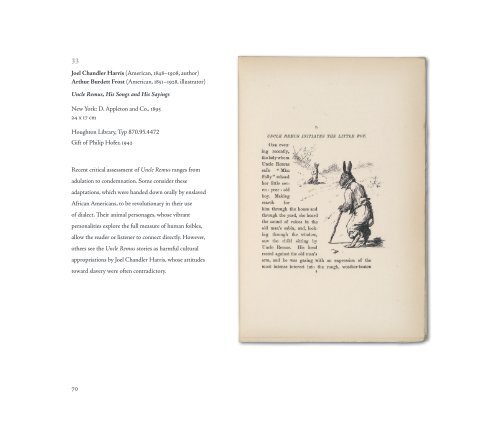Animals Are Us: Anthropomorphism in Children’s Literature; Celebrating the Peter J. Solomon Collection
Why do we tell stories to children through and about animals? Are there reasons why we shouldn’t? Animals Are Us invites explores these questions and more through influential historic examples of anthropomorphism in dialogue with contemporary books drawn from the collection of Peter J. Solomon (Harvard College Class of 1960, MBA 1963) and the holdings of Houghton Library. The exhibition invites you to engage critically with animal anthropomorphism, and delight in the artfulness of this enduring literary genre. Catalog of an exhibition on view at Houghton Library, Harvard University, September 1, 2021 - January 7, 2022.
Why do we tell stories to children through and about animals? Are there reasons why we shouldn’t? Animals Are Us invites explores these questions and more through influential historic examples of anthropomorphism in dialogue with contemporary books drawn from the collection of Peter J. Solomon (Harvard College Class of 1960, MBA 1963) and the holdings of Houghton Library. The exhibition invites you to engage critically with animal anthropomorphism, and delight in the artfulness of this enduring literary genre.
Catalog of an exhibition on view at Houghton Library, Harvard University, September 1, 2021 - January 7, 2022.
You also want an ePaper? Increase the reach of your titles
YUMPU automatically turns print PDFs into web optimized ePapers that Google loves.
33<br />
Joel Chandler Harris (American, 1848–1908, author)<br />
Arthur Burdett Frost (American, 1851–1928, illustrator)<br />
Uncle Remus, His Songs and His Say<strong>in</strong>gs<br />
New York: D. Appleton and Co., 1895<br />
24 x 17 cm<br />
Houghton Library, Typ 870.95.4472<br />
Gift of Philip Hofer, 1942<br />
Recent critical assessment of Uncle Remus ranges from<br />
adulation to condemnation. Some consider <strong>the</strong>se<br />
adaptations, which were handed down orally by enslaved<br />
African Americans, to be revolutionary <strong>in</strong> <strong>the</strong>ir use<br />
of dialect. Their animal personages, whose vibrant<br />
personalities explore <strong>the</strong> full measure of human foibles,<br />
allow <strong>the</strong> reader or listener to connect directly. However,<br />
o<strong>the</strong>rs see <strong>the</strong> Uncle Remus stories as harmful cultural<br />
appropriations by Joel Chandler Harris, whose attitudes<br />
toward slavery were often contradictory.<br />
70



